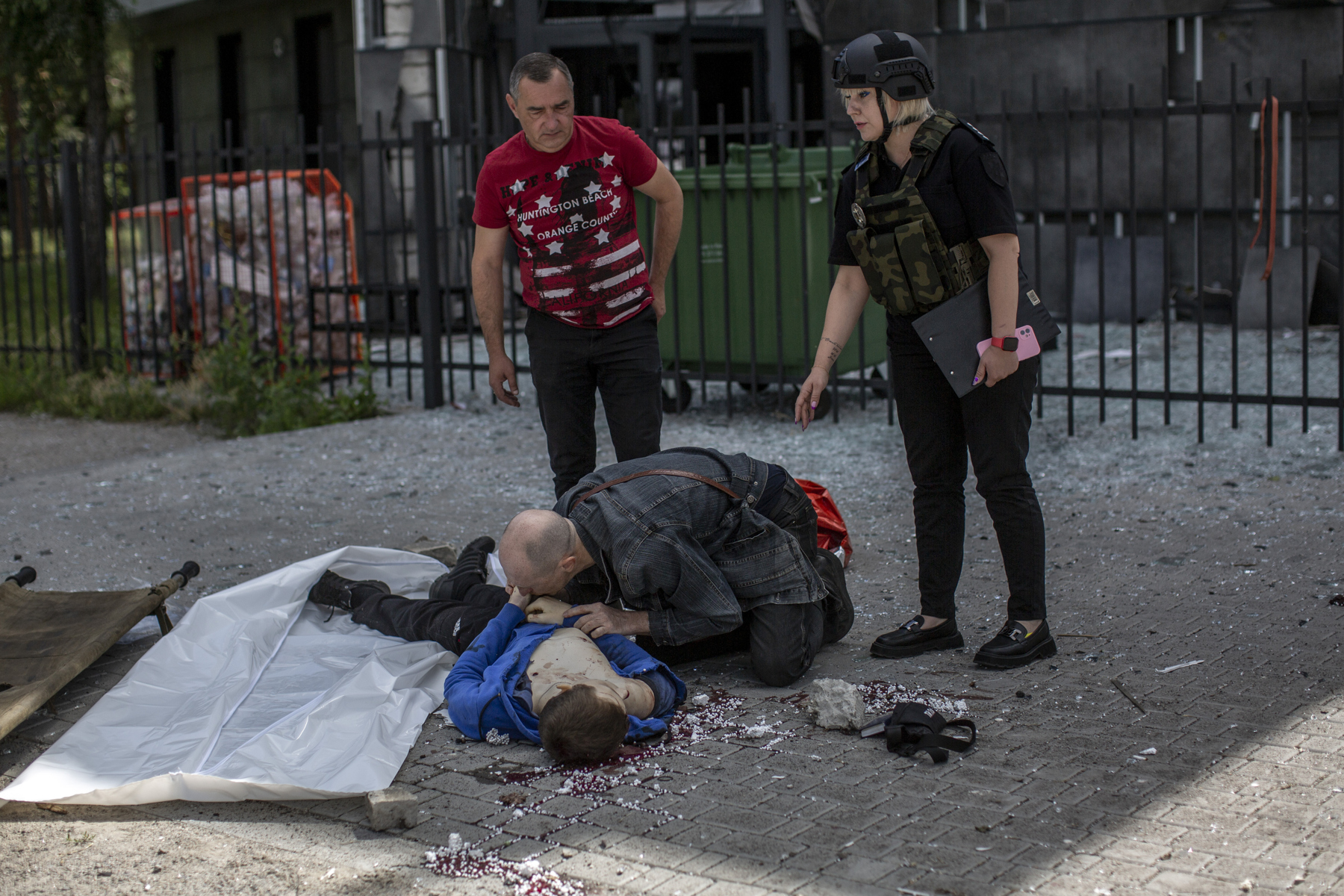Just hours after being woken by Russian missiles, Ukraine’s schoolchildren start the new year

On the morning of their first day of school, the sons of Anna Sushko, 6 and 7 years old, were at a bomb shelter in Kyiv, hiding from Russia’s missile attack.
In the early morning of Sept. 2, when Ukrainian children and college students start their school year, Russia hit Ukraine with 35 ballistic and cruise missiles as well as 23 attack drones. Apart from the capital, they targeted Sumy and Kharkiv oblasts.
"We expected that our neighbor (Russia) would 'congratulate' us (at the start of the school year) with an overnight attack, so we stayed at our parents’ home that has a bomb shelter," Sushko told the Kyiv Independent.
"We went to the bomb shelters as soon as the air raid alert went on. I heard everything, of course, and tried to distract my children with cartoons," Sushko said.
"They had just under four hours of sleep before school," she added.
Despite the stress and the sleepless night, Sushko’s sons went to school this Monday morning, like thousands of other children all over the country. Traditionally, Ukraine’s school year starts on Sept. 1, marked as Knowledge Day. Since it fell on Sunday, the actual back-to-school day shifted to Sept. 2.
"Everyone looked a bit tired, but it went well overall," Sushko said. Her sons started first and second grade.
Russia’s war has brought drastic changes and challenges to the schools across Ukraine. Since Feb. 24, 2022, 365 Ukrainian educational institutions have been completely destroyed by Russian attacks, and over 3,400 have been damaged. The war has killed over 570 children and injured over 1,560, according to Ukrainian officials.
The war-torn Donetsk Oblast has seen the biggest number of destroyed institutions, 111, while the biggest number of damaged ones, 704, has been recorded in Kharkiv Oblast, according to Ukraine’s Education and Science Ministry.
Over 230 educational institutions have been damaged by Russian attacks in Kyiv Oblast and over 150 in the capital itself.
The Sept. 2 attack didn’t spare the Kyiv schools, too: Kyiv Major Vitali Klitschko reported that two schools in Shevchenkivsky and Sviatoshynsky neighborhoods (central and western Kyiv) suffered damage, such as broken windows, in the latest missile strike. Despite the damage, the schools opened to students, according to Klitschko.
Not all Ukrainian children had a chance to go to class in person. The threat of Russian attacks has forced some 900,000 Ukrainian children to study remotely, as only schools equipped with bomb shelters are allowed to operate offline.
Last year, only one-third of Ukrainian children were able to attend schools in person, according to the United Nations. Roughly one-third studied online, and one-third studied in a hybrid mode, mixing online and offline classes, due to the threat of attacks.
For Ukrainian children, this comes on top of two years of remote classes during the Covid-19 pandemic, meaning that many children have had almost no in-person classes in four years.


President Volodymyr Zelensky on Aug. 30 said that "the maximum possible number of schools should open” for in-person attendance.
"It's a matter of availability of shelters and readiness of the energy systems for the current challenges," Zelensky said. In the last week of August, Russia renewed its attacks on Ukraine’s energy facilities, leading to frequent power cuts.
While for Kyiv and other cities far from the front line, it would be easier to carry out Zelensky’s recommendation that classes are held in-person, children in the towns closer to the combat zone and border with Russia, which are targeted more frequently, might have to continue studying online.
The grandson of Halyna Averyna from Sumy is starting his senior year of high school. On Sept. 2, he didn’t get to have his actual first day of school – which would have been the last back-to-school day for him.
The security situation in Sumy Oblast became more tense with the start of Ukraine's cross-border incursion into neighboring Kursk Oblast in Russia, which began on Aug. 6.
"In our city (Sumy), all students have started classes online," Averyna told the Kyiv Independent. "And even during the first class, the air raid siren went off, and they had to stop the class. The Russians could not do without a 'gift' to us on this day."
"Sumy Oblast is under fire every day, so our children are forced to study online until better times," she added.
According to Averyna, the Russian war "has stolen the childhood of our children, taking away their opportunities for social interaction."
"Elementary school students and their parents suffer the most," she said.
Sushko, who co-founded a kindergarten and elementary school outside Kyiv, said being in constant war-caused stress affects children in various ways and can cause anxiety, sleep, and eating disorders.
Averyna, on her part, remains optimistic about the future of Ukrainian children.
"I hope this year will be better than last," she said.

Note from the author:
Hi! Daria Shulzhenko here. I wrote this piece for you. Since the first day of Russia's all-out war, I have been working almost non-stop to tell the stories of those affected by Russia’s brutal aggression. By telling all those painful stories, we are helping to keep the world informed about the reality of Russia’s war against Ukraine. By becoming the Kyiv Independent's member, you can help us continue telling the world the truth about this war


















